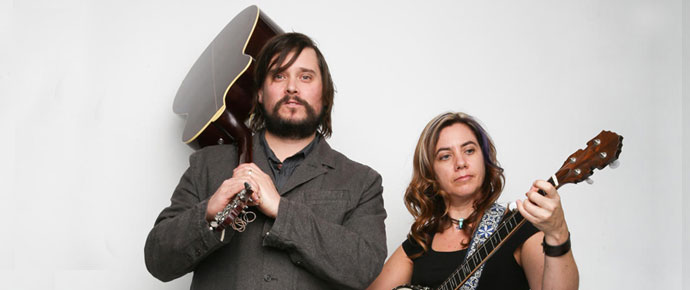
Cara Luft and JD Edwards, the prime members of the Canadian combo known as the Small Glories, mine a sound drawn directly from a distinct rootsy regimen. With their close knit harmonies and an archival folk-like feel, their music taps into tradition while maintaining its contemporary credence. Now, two albums on, they’ve become a force worth reckoning with, seasoned and spirited all at the same time.
“We started singing together after being invited to help celebrate The West End Cultural Centre’s 25th anniversary,” Edwards recalls. “The artistic director of the iconic Winnipeg theatre, Jason Hooper, had paired off singers to perform two songs written by Manitobans, and so he paired the two of us off. What was really interesting about that was we didn’t really know each other, and we hadn’t actually heard the other person sing. Our vocal blend and ability to harmonize and follow each other naturally really surprised us.”
It was a year or so after that that Luft invited Edwards to join her on her solo tours following her departure from her previous folk collective, The Wailin’ Jennys.
“I had been pursuing a solo career prior to my time with the Jennys, and after going back to my solo stuff, I realized how much I missed singing harmony with others,” Luft explains. “I would often hire side guys to join me on tour, which helped fill out the sound. But they weren’t always singers, and I found myself longing to find a voice I could match with. I also found myself wanting to sing with guys. There’s something about the sonic tension you can create with that female/male combination. The Jennys was such a beautiful project, with that stunning three part harmony, but it didn’t have the oomph that I experience when singing with a male. When JD and I started rehearsing for this anniversary show in Winnipeg, I was pleasantly surprised by how well our voices matched. Long story short, I think we both ended up finding a superb singing partner and an artistic collaborator in each other.”
In fact, the audience reaction was so positive that the two decided to continue to work together. They eventually morphed formally into the Small Glories, whose debut album, Wondrous Traveler, seemed to sum up their sentiments.
“We got the name from our producer, Neil Osborne,” Edwards recalls. “It was on the last day of recording Wondrous Traveler when he said he had the perfect name for us. It was such a good name that he said if we didn’t take it in ten seconds, he was going to keep it for himself and start a new band! Ha! Once we heard it, we knew it was a keeper. Since then we have fallen in love with the name and believe it fits us really well. Small Glories are all around us. We see them when we’re on the road — when people open their homes for us to crash after shows, or when someone gives us good advice on a short cut to the next town, or when someone brews us a delicious cup of coffee.”
Not surprisingly, both Luft and Edwards were weaned on bluegrass and other forms of traditional music, and it’s those pervasive musical strains that continue to be manifest in their efforts today.
“I was brought up by professional folk singing parents who’d drag my sister and I off to concerts, festivals, folk clubs and the like all during my formative years,” Luft recalls. “They also would host musicians who were touring through town, and often put on house concerts in our basement. It was a rather unique and wonderful upbringing, being surrounded by live music, and being encouraged to play music, as opposed to watching TV. I started playing when I was quite young — four years old in fact — and things just progressed as I hit my early teens. I was always drawn to acoustic music, particularly folk and folk rock, and, of course, bluegrass as well. In fact my exposure to bluegrass saw me trade in my electric guitar at age 15 for a mandolin.”
“When I was kid, I was always into whatever music my brother was into,” Edwards remembers. “Because of him, I listened to Bruce Springsteen and The Police and, oddly enough, the Nylons. In high school I started listening to Tower of Power and Blood Sweat and Tears. The horns — oh the horns! — I loved it. A lot of music has moved me through the years. I like The Greyboy Allstars and Bruce Cockburn. I am a fan of Bela Fleck and the Flecktones. I have a huge respect for Ben Harper and John Popper. The Allman Brothers always make my day. However, among my favorite music these days is a Tim O’Brien and Darrell Scott record called Real Time. I love every song, but the track Helen of Troy, Pennsylvania slays me every time I listen to it.”
“I was steeped in my dad’s vinyl collection, and there were so many incredible artists that influenced me,” Luft adds. “As a kid I listened a lot to Buddy Holly, the Everly Brothers, Steeleye Span, Pete Seeger and The Weavers, Fairport Conventon, Martin Carthy, the Beatles, Bruce Cockburn, the Chad Mitchell Trio. One of my favorite albums was the Nitty Gritty Dirt Band’s Will The Circle Be Unbroken triple vinyl that came out in 1972, a few years before I was born. I remember playing this particular one over and over and over… With folks like Maybelle Carter, Doc Watson, Merle Travis, Earl & Randy Scruggs, I was hooked. In my teens. I was really focused on the guitar and I listened a lot to Led Zeppelin, Dick Gaughan, Joni Mitchell, Pentangle — with guitarists Bert Jansch and John Renbourn — Carol McComb, Spirit of the West, and, of course, indie rock and pop. When Ani DiFranco came on the scene, it was a bit of an ‘aha’ moment for a lot of female artists like myself. And there were other female artists who started to make a big impact on me as well, artists like the Indigo Girls, Sarah McLachlan and Emmylou Harris, whose Wrecking Ball album blew me away. Nowadays I’m so fortunate to listen to my musical friends and the many artists we hear at different festivals.”
The duo’s enthusiasm clearly affects their audiences as well.
“People feel welcomed,” Edwards says. “They feel joy, and dare I say, they feel they’ve had a bit of a break from whatever stresses they’re dealing with. They laugh, they sometimes cry, and they often sing along. Some folks leap out of their seats and rush the stage. We’ve had folks dance with us on stage and then they continue to invite more folks up from the audience to dance. They have a joyous time! The feedback we often get is ‘thank you, I needed that.’ They love our passion, they love that we sing with our whole beings. They love the humor and the banter on stage. We’re pretty authentic when we’re up there, and we really love to engage with our audience. We want to offer them some respite and some hope, and I think we’re succeeding with that on some small level.”
And, the process, create those small glories every time they do.







